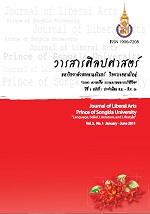DEVELOPING A TRAINING MODEL FOR PRIMARY SCHOOL ENGLISH TEACHERS THROUGH THE INTEGRATION OF POSTMODERN LINGUISTIC CONCEPTUAL FRAMEWORK
Keywords:
TEFL in primary school education, teachers’ training mode, Postmodernism, CrosstalkAbstract
This research concerns the development of the language teachers in primary schools in Chachoengsao through the integration of postmodern linguistic conceptual framework with the purposes to 1) explore the conditions of learning the English language in primary schools, 2) develop training model for primary school English teachers based on the requirements of the national curriculum expectation, and 3) study the effectiveness model of the training model.
The study used quantitative and qualitative research methods for data collection and analyses. The population consist of 210 primary school teachers in Chachoengsao by Yamanae sample size, of which 20 from 18 schools in seven districts were samples in the study.
The method of professional development consisted of three workshops: 1) Crosstalk techniques to develop communicative skill, 2) identification of units of study and classroom instruction through examination of the requirements of the national curriculum, and 3) implementation of Crosstalk in the English lessons. The follow-up procedure of monitoring and coaching was conducted at the schools, combined with teachers’ seminars to reflect on the development of the teachers’ training progression.
Findings from the school survey indicate that 16.7% of the teachers obtained English language credentials from accredited universities. In addition, the findings reveal that the main teaching method is rote learning, grammar translation, and use of decontextualized vocabulary. Also the English teachers need continuous development of English for communication skills, curriculum and teaching techniques, due to 83.3% of the English teachers not having English language credentials.
The professional development model for in-service English language teachers in Chachoengsao is validated on five principles: 1) empowering the teachers to be efficient in language for communication, 2) using the English language as the medium of classroom instruction for teachers’ training workshops, 3) implementing teachers’ knowledge and skills acquired from the workshops, 4) monitoring and coaching teacher trainees, and finally 5) organizing seminars with teachers’ input.
Moreover, the teacher training model reflected that Crosstalk enabled the teachers to naturally develop English for communication. They are able to create lesson plans based on national curriculum, incorporating varieties of teaching techniques. This leads to building teachers’ learning community across the school districts of Chachoengsao and Rajabhat University, and also the sharing of resources and ideas across the community. Finally, suggestions have been submitted to the Chachoengsao Education Office: Area 1 and Area 2 on the recruitment and professional development of English teachers based on the findings of this research.
Downloads
How to Cite
Issue
Section
License
The authors retain the copyright to their article but the Journal of Liberal Arts, Prince of Songkla University reserves the exclusive rights to first publication.





